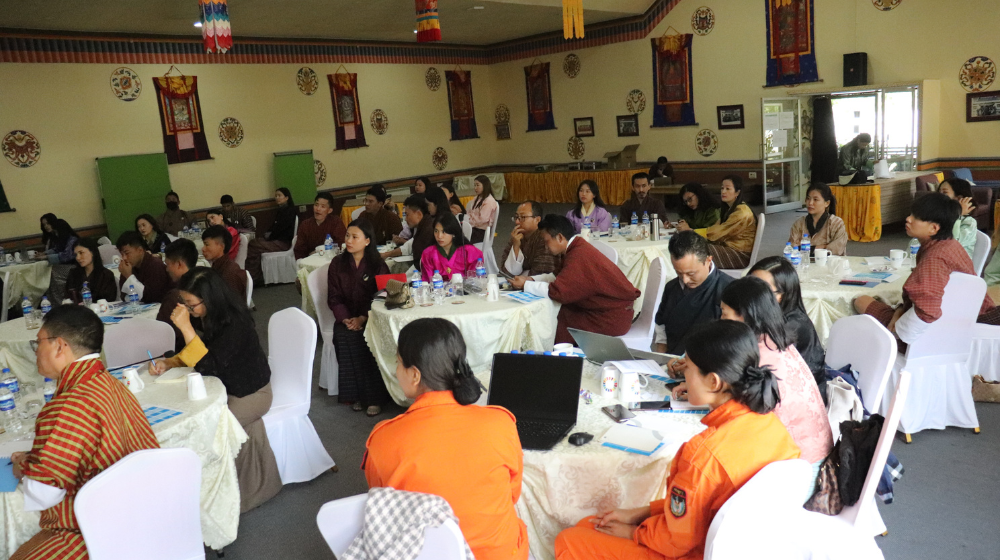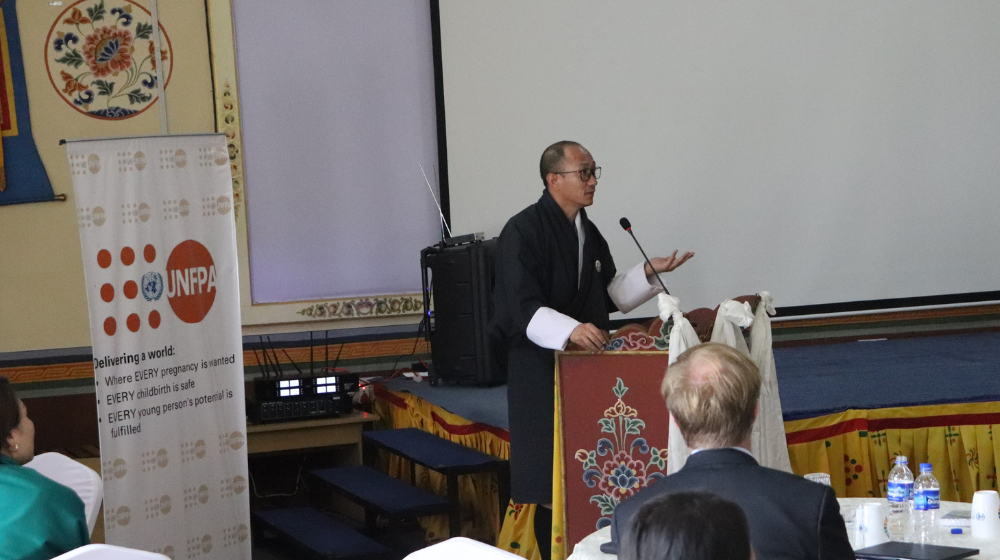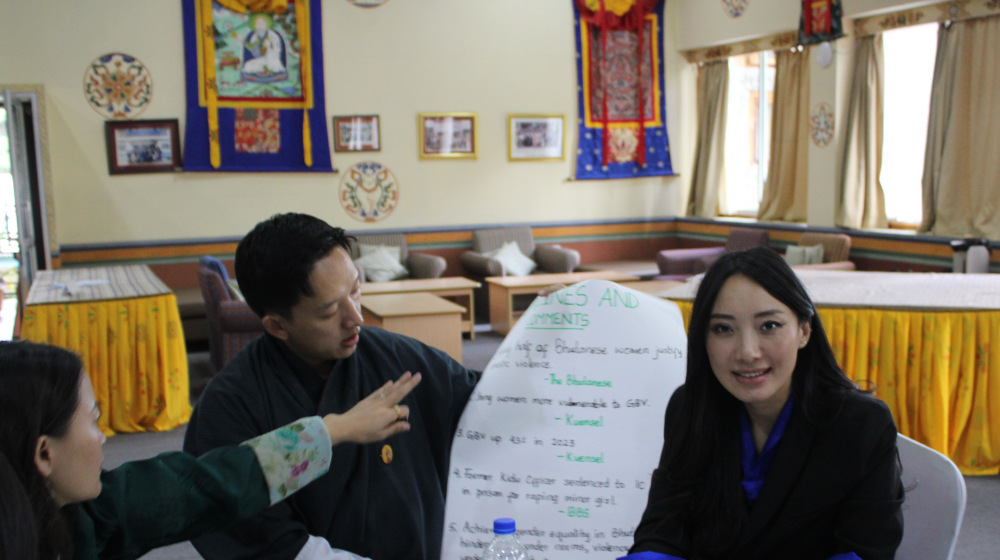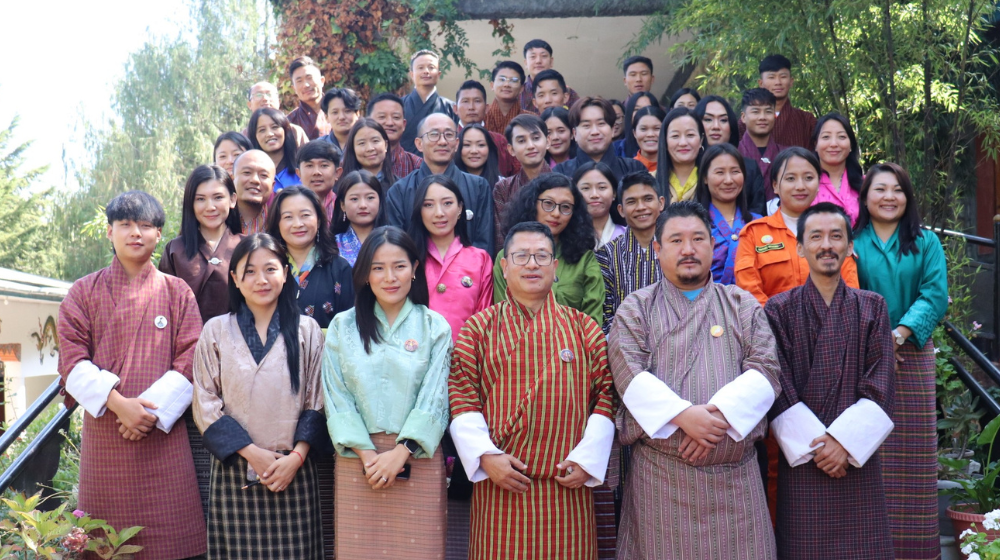As the three-day workshop commenced, the facilitator asked, "How many of you are aware of the upcoming 16 Days of Activism against Gender-Based Violence (GBV)?" Out of 55 participants, including 35 journalists, only three raised their hands, while the rest exchanged puzzled glances.
For many, this campaign was a new concept.

The 16 Days of Activism is a global campaign held annually from November 25, starting with the International Day for the Elimination of Violence Against Women, and concluding on December 10 with Human Rights Day. Led by the UN Communications Group (UNCG) in Bhutan, with the United Nations Population Fund (UNFPA) as the technical lead, the campaign aims to mobilize action to end violence against women and girls in Bhutan.
The aim was to bring together key stakeholders from the media, social media influencers and content creators, and marginalized communities to co-design a campaign that reflects the lived realities of all Bhutanese, particularly the most vulnerable.
Inaugurating the workshop, the Head of the Resident Coordinator’s Office of the United Nations in Bhutan, Timothy Wilson, emphasized three approaches: "Rise, Think, and Smile" to guide discussions on GBV and raise awareness. He said there is a need to draw attention to the prevalence of violence, its impacts, and the importance of advocacy for change.
According to Wilson, the workshop was expected to encourage participants to raise awareness, promote critical thinking, and maintain a hopeful and positive outlook to drive change.

UNFPA’s Head of Office, Phuntsho Wangyel, highlighted the organization's search for collaboration and partnerships with the media. "I'm here, not only because I firmly believe in rights and choices, but also because we, at UNFPA, believe in the role of individuals as agents of change, who can actually transform societies now," he said. "We can't do it by ourselves. And we really need you, the media. How we consume news and information has changed. The speed at which we consume it has also changed. So, it's very important that we engage you."

The workshop equipped journalists, social media influencers, and advocates with skills for impactful storytelling, ethical reporting, and inclusive advocacy on GBV. It also fostered partnerships among media professionals, influencers, Civil Society Organizations (CSOs), and the LGBTIQ community, strengthening advocacy efforts for GBV prevention in the country.
Focused on creating a campaign that reflects the lived experiences of all Bhutanese, especially the most vulnerable, the workshop produced a detailed action plan for the 16 Days of Activism 2024, outlining key messages, activities, and communication strategies. This laid the foundation for a more inclusive, impactful, and far-reaching campaign in Bhutan.
Gender-Sensitive Reporting
Journalists received training in ethical reporting on GBV and child protection, with an emphasis on relevant legal frameworks. During discussions on GBV and child protection laws, ethical interviewing practices, and contributions from the Office of the Attorney General, participants were cautioned against revealing the identities of GBV victims or survivors.
To build skills in gender-sensitive reporting, UNFPA’s Gender & Youth Program Specialist, Jigme Choden, presented data from the Bhutan Prevalence Survey and National Health Survey (NHS) 2023, discussing the responsible representation and reporting of GBV, including ethical and safe use of administrative data for GBV reporting.
Sexual and Reproductive Health and Rights (SRHR) Program Specialist, Karma Tshering, focused on fostering a more informed and supportive public dialogue around SRHR in Bhutan. She also emphasized the need for comprehensive SRHR services for all.
Presenting the country's demographic trends and fertility issues, data analyst Cheda Jamtsho discussed Bhutan’s declining fertility rates and aging population in the context of global demographic trends and policy implications.
The NHS 2023 highlighted that GBV remains a significant issue in Bhutan, with 44% of women aged 15-64 still perceiving violence as a normal part of life, underscoring deeply ingrained societal behaviors.
Empowering the Media for Impactful Storytelling
Facilitator Namgay Zam, a social media influencer, led sessions on responsible reporting on violence against women, best practices for interviewing survivors, and engaging with stakeholders sensitively. She emphasized moving beyond mere facts and figures to develop stories that capture the human side of gender issues and inspire social change.

Journalists were guided on identifying newsworthy topics, conducting thorough research, and ensuring accurate fact-checking.
Participants found the workshop informative and valuable. They recommended that such workshops be organized regularly to familiarize young journalists with GBV and child protection issues. “This was a really important workshop that helped shed light on the challenges facing survivor of GBV, which journalists and social media influencers may or may not fully understand,” BBS editor Kipchu said. “By bringing together individuals from diverse backgrounds, it enhanced the exchange of perspectives and facilitated dialogue on critical issues like gender inequality, GBV, and other gender-related issues.”
Yangyel Lhaden, a reporter with Kuensel, described the experience as a space that allowed discourse with diverse views from participants from different professions, not just journalists. Yangyel’s dedication to reporting on gender issue earned her the prestigious South Asia Laadli Media and Advertising Award for Gender Sensitivity (SALMAAGS) this year, which recognizes individual’s contributions to advancing gender sensitivity in South Asian media.
Social media influencer and actress, Sonam Choki, summed up the workshop as a platform for networking with people from diverse backgrounds. “It was an insightful three days for me as I got to connect with people who are in positions to influence the country’s dialogue in a positive way. I feel empowered and motivated to share what I’ve learned here with those around me.”

More than 50 participants, including journalists, social media influencers, representatives from the LGBTIQ community, and officials from UNFPA and the UN, attended the workshop.


